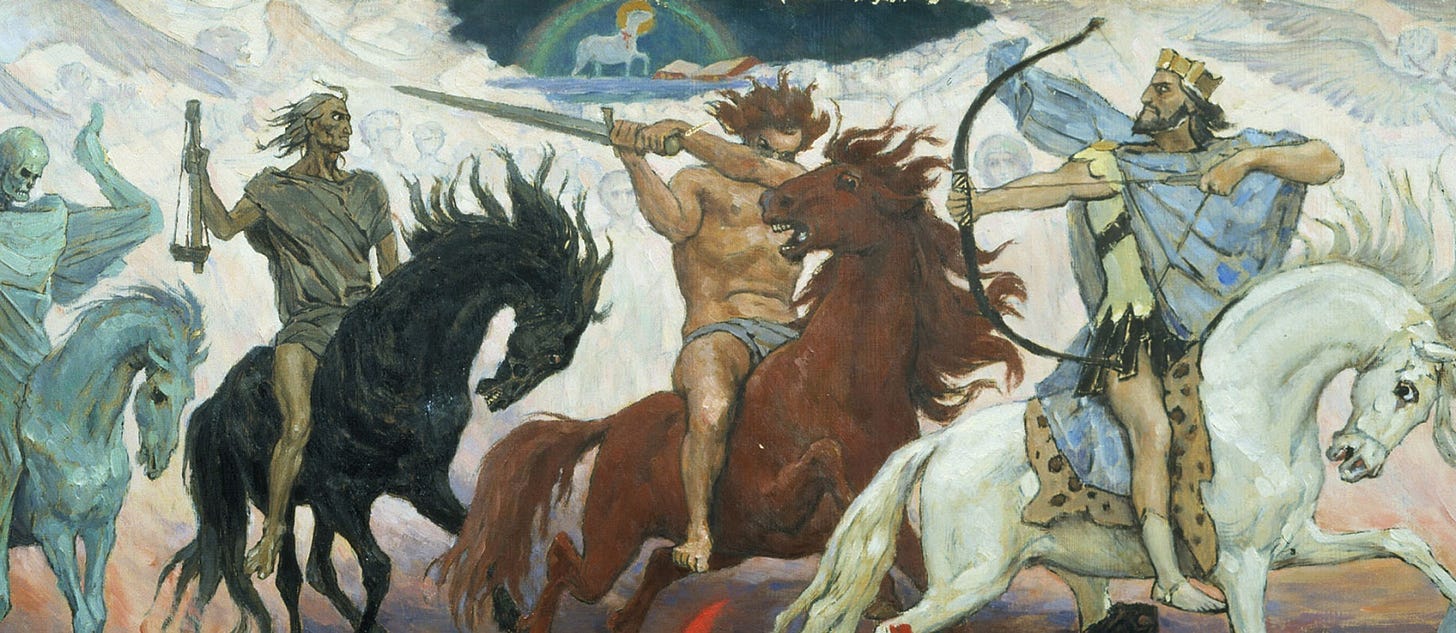Why Am I Writing about Revelation?
A Journey from American Propaganda to Christian Dissidence.
Next week, I'm taking a break from Revelation to observe Holy Week and prepare my Easter teachings. But I wanted to do something different this week. One question that keeps popping up in conversations is why.
Why am I teaching and writing about this bizarre book at the end of the Bible?
It’s quite simple. I believe that Revelation was written to confront much of the idolatry we are witnessing today, and I want to take a few minutes (and two thousand words) to explain myself.
The Most Widely Unread Book of the Bible
I never read the book of Revelation growing up. I couldn’t. It didn’t make sense to me, and I suspect it didn’t make any sense to the pastors I sat under every Sunday, either. Though they would never have said as much, I was quick to notice that the only ones who preached or taught from the book of Revelation were the “specialists,” men like Jimmy DeYoung and Tim LaHaye. They were the opposite of my pastors because they only taught about Revelation. Their teachings had roots in the early 19th-century theological movement called Dispensationalism, which required a speculative reading of the book of Revelation.
When they read passages like Revelations 4:1, where Jesus is recorded as saying, “I will show you what must take place after this,” they assume that Jesus is discussing our future as Americans. And many of them believed that America held a special place in God’s heart.
In the dispensationalist reading, each character, color, number, scroll, seal, bowl, and beast represented some person, nation, or event in our history or our soon-to-be future. In their view, the locust-like creatures that fly and sting might represent helicopters or tanks. They taught that the battle of Armageddon was a literal event that would take place in the valley of Megiddo in northern Israel, and Jesus would ride a literal white horse with a literal sword and literally kill the unbelievers who met him on the battlefield. I had heard that Mikhail Gorbachev was represented in the book, along with Hillary Clinton (often spoken of as the Anti-Christ) and Vladimir Putin, to name a few.
Someone Was Up to Something
My first red flag was when I noticed the partisan divide between the good characters and the bad ones. I remember a man that I looked up to made a list of possible candidates for AntiChrist, each one of them a Democrat candidate for president at one point or another.
Something was up.
In the late 90s, I attended Liberty University, where I sat under dispensationalist professors who waxed on and on, attempting to decode the book's secrets. One of our guest lecturers, Tim Lahaye, went on to make millions selling fiction books about Christians living through tribulation under the AntiChrist. Several of these books became movies starring the likes of Kirk Cameron and Nicholas Cage.
“How could something so widely accepted be wrong?” I thought. “Surely these esteemed Christian leaders had taken the text seriously enough to know what they were talking about.” But they hadn’t, and they didn’t.
The problems started when I began reading church history and realized that no one in the Early Church, the Byzantine Church, or the Medieval Church made mention of any of the ideas foundational to these speculative readings. I also learned that this type of speculative reading first appeared as recently as the 1830s.1 This means that before the 19th century, Christians neither taught nor believed what I had received through my faith tradition.
This was the start of a lengthy deconstruction and detangling of dispensationalist eschatology (study of the end of days) from my faith. And with that detangling came a “revelation” that my eschatology only worked if I was a part of one particular political party. I noticed that the faith I had been given was all tangled up in a web of right-wing politics that placed Republicans on one side of the book (the good side) and Democrats on the other (the enemies of Christ).
By my mid-twenties, I had shaken those ideas loose, but I had not learned how to replace them with something better. Old habits are hard to break, so as I read Revelation my brain would default to my old speculative ways of reading.
I suddenly realized why my pastors wouldn’t preach the book. They simply didn’t know how, and when they sought better sources, they were often accused of having suspect theology. As a result, I would not preach through it. I would teach on the seven churches from chapters 2 and 3, but I would venture no further.
Disarming Revelation
My post-grad work (Northern Seminary) gave me the tools I needed, but when I finally read the book in the context and spirit its author intended, I noticed a darker side to dispensationalist readings of Revelation. Their readings had formed them to be pro-Babylon and anti-Lamb.
John’s Revelation to the churches was written initially to inoculate them from the infectious wiles of Babylon. John’s vision is crafted to inspire dissidence and encourage Christians already in tribulation under the Roman empire. Johns's point in writing is to help the Christians resist the empire, its opulence, its violence, its lust for power and status, and the way that it exploits human beings to produce obscene wealth and idolatrous worship of its emperors.
Speculative readings of the book of Revelation have twisted and turned the book, rendering it unreadable without their lenses, which act as some secret decoder ring or perhaps a Rosetta stone to help you see the future. If you wanted this lens, they were happy to sell it to you, either in book form or as a guest speaker on their North American church tour.
All of this had the effect of disarming the book, rendering it impotent to confront the American nationalist idolatry, the worship of seats of power, and the patterns of this world (Romans 12:1) that Paul warned against.
From Dissidence to Propaganda
Without the book of Revelation acting as a vaccination to nationalist idolatry, the American church had no reason not to start participating in the idolatry of Babylon described in Revelation 17 and 18. Free to stockpile wealth and firearms and exploit low-wage workers, evangelicals began to abandon things like public education, healthcare for the poor and middle class, and social safety nets, all of which were once staples of the evangelical church before dispensationalism.
Instead, the speculative reading of Revelation produced the kinds of idolatry we see in America today. Movements like Christian Nationalism were once dismissed as idolatrous ideas, but the speculative reading encourages this type of heresy. It produces the exact opposite of what John was trying to stir within Jesus' followers.
I would argue that the speculative reading of Revelation helped pave the way to where American Evangelicals find themselves today, worshipping demagogues, dividing a nation, and threatening our shared democracy; the very things John was writing to repel.
Why do I read/write/preach Revelation?
Because I believe Christ, not the US government, has laid the path to peace.
I write about it because I believe that if Christians read Revelation for all that it is worth, they would not be led astray by the lust for power and wealth.
I read it because I believe that Revelation, read rightly, will stir peace and enemy love rather than fear and violence.
I preach about it because I believe that God’s work does not center on the seats of power but on all those who, like Jesus, suffer under the weight of injustice, oppression, inequality, and exploitation.
Revelation is for dissidents, not patriots, and it’s time we gave it back to those who would use it to free captives rather than sell books.
Grace and Peace.
For more info, check out The Rapture Exposed, by Barbara Rossing.







This resonates. I grew up in a dispensational church and then attended a dispensational Bible college (which thankfully had the opposite effect of turning me into a presbyterian). I’m fascinated (and horrified) by the ways in which Revelation, as well as the Gospel of John, have been flipped on their heads to justify the oppression they critique. After reading Revelation for the Rest of Us last year, I started seeing similar themes in John’s Gospel and believe it had a similar intent of inoculating the spirit of empire that inheres to sinful nature. Like Revelation, John was written to an oppressed people, but once later readers of John came into power, that Gospel became the chief biblical justification for imperialistic anti-semitism. Here’s part 2 of a series where I developed some of that way of reading John: https://www.aaronjhann.com/p/when-empire-comes-to-church-part.
I decided long ago not to study relevation... I love tapping into worship and look forward to the next sermon series.